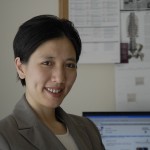Covid-19 has dramatically affected society, requiring changes in every aspect of how we work, learn and play. Faculty members of the Department have risen to challenges in research by adapting ongoing studies, starting new initiatives to make sure that patients receive rehabilitation services, providing information to manage chronic health conditions, assisting with diagnoses, and treating secondary health issues caused by the Corona virus.
Physical distancing mandates have led to widespread research suspensions to protect researchers and participants. However, research continues and our faculty members are rapidly adapting their efforts to make discoveries in a new world reality.
Keeping track of symptoms and treatment is important for people with rheumatoid arthritis (RA) to live well. This is why Dr. Linda Li developed an online tracking tool that is now being tested in a community-based study. Dr. Li’s team has heard from patient partners and study participants about the new challenges to managing their health during the pandemic. Given the situation, she recently released a part of this online program for people with RA to track their symptoms, medication use, and self-care goals. If they use a Fitbit, they can also sync it with the online tool and view their physical activity data along side other data such as medication use and symptoms over time. Users can use the information to inform self-care decisions and share it with their rheumatologists during telehealth consults. Dr. Li team will also use this opportunity to develop an online cohort to understand the impact on the health in this population during and after the pandemic. Dr. Li is also collaborating with a team in the U.K. to interview people with RA to study the impact of the pandemic response strategy on self-care. They will explore topics such as being physically active, managing stress, eating well, and accessing essential medication, such as hydroxychloroquine, a drug that has been touted by some as a treatment of COVID-19 despite the low quality evidence to date.
Dr. Jordan Guenette is working with Agartee Technology Inc. to develop and test a multimodal biosensor for screening, detection and monitoring covid-19 patients. Real-time and continuous monitoring of several physiological parameters related to respiratory function, blood oxygenation, and temperature among other variables, enables clinicians to optimize treatment options and assess the prognosis of the disease in each individual. This device is currently in use in British Columbia, Ontario, Quebec, and Japan.
Dr. Pat Camp is a member of Providence Health Care/Vancouver Coastal Health’s COVID-19 post-acute clinical planning team and is working to coordinate research logistics for their COVID projects — of note, over 100 projects have been registered with BC Academic Health Network. Dr. Camp is also participating in a Fraser Health Authority initiative to research a “virtual hospital” that will provide rehab care to recently discharged patients after COVID-19. Dr. Kristin Campbell created and posted a summary of safe exercise principles for exercise at home for people with cancer along with a list of vetted cancer specific on-line exercise videos. In addition, her team has made public the instructional video on how to self-monitor arm size for women after surgery for breast cancer https://cepl.rehab.med.ubc.ca/how-to-measure-your-arm/. Physios in Canada and the US are using this for tele-rehabilitation visits with clients who are at risk of developing lymphedema and who are being treated by a PT for lymphedema.
Dr. Kristin Campbell created and posted a summary of safe exercise principles for exercise at home for people with cancer along with a list of vetted cancer specific on-line exercise videos. In addition, her team has made public the instructional video on how to self-monitor arm size for women after surgery for breast cancer https://cepl.rehab.med.ubc.ca/how-to-measure-your-arm/. This is being used by PTs in Canada and the US for tele-rehabilitation visits with clients who are at risk of developing lymphedema and who are being treated by a PT for lymphedema.
Rehabilitation after stroke has been severely disrupted by Covid-19 and Dr. Janice Eng and her trainees are responding to fill the gap in care. She created and posted a 2-page handout of the “safer” exercises from her FAME program, as well as videos of each exercise, plus tips on safety and progression for physiotherapists and people with stroke to use at home. FAME is a group exercise program developed for people with stroke who have some standing and walking ability and it has been shown to improve mobility, cardiovascular fitness, and arm and hand function.
Dr. Eng also partnered with the BC Stroke Recovery Association of BC to deliver a virtual GRASP Program via zoom to improve arm and hand function after a stroke. To evaluate the effectiveness of this delivery method, her team is developing outcome measures that can be completed through video applications such as Zoom for Healthcare. Her team is also adapting her GRASP program handbook to include items people will likely already have in the home. They plan to survey the patients and facilitators on their experience using this delivery method.
All our research faculty are working to develop responsive functional outcome measures that can be utilized in research via video applications. Reliability tests they will be applying to these outcome measures will be a huge advance for researchers across the globe even in the post-Covid world.




